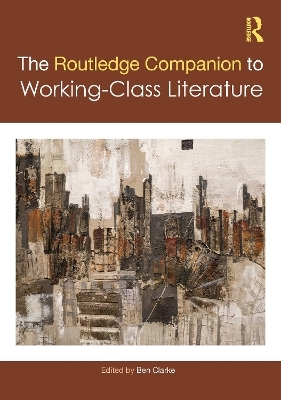
The Routledge Companion to Working-Class Literature
Routledge (Verlag)
978-1-032-12786-6 (ISBN)
- Noch nicht erschienen (ca. Dezember 2024)
- Versandkostenfrei innerhalb Deutschlands
- Auch auf Rechnung
- Verfügbarkeit in der Filiale vor Ort prüfen
- Artikel merken
The Routledge Companion to Working-Class Literature provides an overview of the history, theory, and analysis of working-class literature. Taking a global and intersectional approach, the Companion demonstrates that literature is central to the (re)interpretation of the working class, a process that involves rereading the past as well as mapping the present.
The collection examines how working-class literature is defined and the functions the term serves. It maps current debates and traces the ways in which a wide variety of theoretical and political movements have shaped the field. Challenging the stereotypical view that working-class writing is concerned solely with white, male industrial labourers in the Global North, the volume features chapters on subjects from early modern writing about the poor in England to contemporary poetry by Asian migrant workers. Exploring the theoretical problems of writing about class as well as providing detailed readings of specific texts, it demonstrates the richness and diversity of this rapidly developing field and looks to the future of working-class literature.
The Routledge Companion to Working-Class Literature is an accessible, wide-ranging resource. It emphasizes difference and debate, bringing distinct texts, traditions, and critical perspectives into dialogue and is essential for any student or researcher looking at concepts of class within literary studies.
Ben Clarke is Associate Professor of Post-1900 British Literature at the University of North Carolina, Greensboro, USA. His publications include Orwell in Context: Communities, Myths, Values (2007), Understanding Richard Hoggart: A Pedagogy of Hope (with Michael Bailey and John K. Walton, 2012), and Working-Class Writing: Theory and Practice (co-edited with Nick Hubble, 2018).
Introduction: What is Working-Class Literature?
Part I. Theorizing Working-Class Literature
Chapter 1. Working-class literature(s)
Chapter 2. Revolutionary Tendencies: Theories of Working-Class Writing
Chapter 3. Writing a Class to Come: Social Fiction, Heterogeneity, and the Political
Chapter 4. Seeing Anew: Making Working-Class Literature Visible Through a Working-Class Intersectional Gaze
Chapter 5. Struggle as Class Motif: ‘Difficulty’ in Douglas Stuart’s Shuggie Bain
Part II. Literature and the Making of the Working Class
Chapter 6. Literature and the Labouring Poor in Early Modern England
Chapter 7. The Rhyme of the Ancient Labourer: working-class poets and the classics
Chapter 8. The Invisibility of Working-Class Self-Representation in Literary Classrooms, with a Focus on the Romantic-Period
Chapter 9. Working-Class Writing in Victorian Britain, 1837-1901
Chapter 10. Working-Class British Women Writers, 1840-1914: Resistance and Community
Chapter 11. One Hundred Years of Defining (German) Working-Class Literature
Part III. Working-Class Literature in the Age of Extremes
Chapter 12. D. H. Lawrence, Class and Culture
Chapter 13. Work, Sex, and Women in D.H. Lawrence’s Fiction: Intersections of Class and Gender
Chapter 14. ‘Clamouring for Revolutionary Literature’: Working-Class Writing in the Caribbean
Chapter 15. Coalitional Politics for Exiles and Nationalists: H. T. Tsiang’s And China Has Hands
Chapter 16. Broken Hands: Class and Disability in 20th-Century American Poetry
Part IV. Neoliberalism and the Future of Working-Class Literature
Chapter 17. Dramatic Representations of ‘Them’ and ‘Us’ Class Struggle in Neoliberal Britain
Chapter 18. Music and hope in Irish working-class recession writing: Roddy Doyle’s The Commitments and Emmet Kirwan’s Dublin Oldschool
Chapter 19. Representations of Class and Race in East African Asian Literatures
Chapter 20. Beyond Human Futures in Indra Sinha’s Animal’s People
Chapter 21. The Labor of Migrant Subjectivity
Chapter 22. Migrant Workers in Asia Today: A Brief Introduction.
Chapter 23. Working-Class Representation in Cinema and Literature in the Digital Age
Chapter 24. Common People: Breaking the Glass Ceiling in UK Publishing
Chapter 25. An Alternative History of Working-Class Theatre
Chapter 26. Keeping Class Visible in Recession-Era Irish Poetry
Chapter 27. Proletarian Futures: Some Representations of the Working Class in Science Fiction”
Index
| Erscheint lt. Verlag | 31.12.2024 |
|---|---|
| Reihe/Serie | Routledge Literature Companions |
| Zusatzinfo | 4 Halftones, black and white; 4 Illustrations, black and white |
| Verlagsort | London |
| Sprache | englisch |
| Maße | 174 x 246 mm |
| Themenwelt | Geisteswissenschaften ► Sprach- / Literaturwissenschaft ► Anglistik / Amerikanistik |
| Geisteswissenschaften ► Sprach- / Literaturwissenschaft ► Literaturwissenschaft | |
| Sozialwissenschaften ► Soziologie ► Makrosoziologie | |
| ISBN-10 | 1-032-12786-4 / 1032127864 |
| ISBN-13 | 978-1-032-12786-6 / 9781032127866 |
| Zustand | Neuware |
| Haben Sie eine Frage zum Produkt? |
aus dem Bereich


